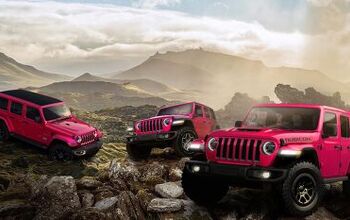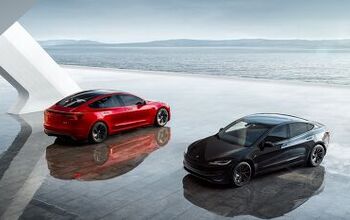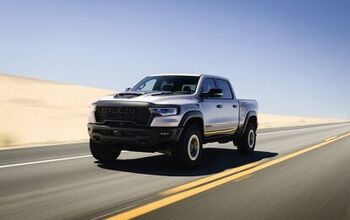Report: Middle America Just Isn’t Having EVs

Depending upon where you live, battery electric vehicles are either gradually becoming commonplace or rarer than a two-dollar gallon of gasoline. A new study from S&P Global has helped illustrate the current regional phenomenon, with an accompanying report that suggests it won’t be lasting forever due to the industry pivoting to build more mainstream EVs while the United States expands its charging network.
As things currently stand, the overwhelming majority of plug-in transportation is sold along the coasts. Taking national sales data from January to August of 2022, S&P Global asserted that 22 non-coastal states (from Nevada to West Virginia) only comprised about 16 percent of national EV sales. This is even reflected in metropolitan areas where all-electric cars have a tendency to thrive. For example, Los Angeles enjoys an 18.9-percent share of the market, San Francisco enjoys 10.8 percent, and New York is closing in on 7 percent while the entire state of Arkansas is sitting at just 0.2 percent.
However, S&P Global is claiming that won’t remain the case forever.
"More acceptance and much broader consumer awareness is resulting in a natural progression of [EV] adoption from the coasts to the heartland," Tom Libby, an analyst at the S&P Global Mobility division, was quoted as saying by Automotive News.
He also explained that the 22 states that were selected to represent the American heartland adhered to the term in the broad historic context. But the important thing is that these are places where people are likely to put more miles on their car per year than someone living on the coast and are less likely to have access to robust charging networks like the ones that have been rolled out in California. S&P Global has claimed that, due to the $5 billion earmarked for electric vehicle charging networks in the massive Biden infrastructure package, range anxiety should come down as the number of stations goes up.
Cost is another factor. EVs tend to retail for far more than their combustion-reliant counterparts and appear in the driveways of pricier homes with nice garages where they can be charged every night. But S&P Global believes automakers are about to change that trend by swapping their core lineups to include more all-electric options. Of course, this also means there will be fewer gasoline and diesel-driven vehicles to choose from in the years ahead.
"Automakers are beginning to produce more mainstream electric vehicles," said James Martin, another analyst at S&P Global. "Availability of these vehicles will most likely be a factor in spurring installation of more charging infrastructure."
Though the mere fact that the group has a “Mobility division” seems to indicate that it’s already on board with the premise that all-electric vehicles are the future of transportation. The term has been utilized by pro-EV manufacturers and industry groups prior to 2015 and is a pretty good way of sniffing out what side of the argument someone is likely to be on.
Among the states in the S&P study, Wyoming and North Dakota had the lowest national EV share – having so few sales that its tally for the January to August period effectively came up as a zero. Broken down to individual cars, Wyoming had just 146 EV sales while North Dakota had 143. Much of this was attributed to insufficient charging stations, though something tells me the brutally cold winters experienced in those states also played a factor. Batteries don’t perform as well in cold environments and, despite automakers trying to get around this with clever thermal management strategies, it typically means a notable loss in range as the temperature drops to below freezing.
"While the heartland states represent 27.1 percent of total U.S. vehicle retail sales through August, their representation in EV adoption has remained stagnant from 2021 into this year at a tepid 15.5 percent share," S&P Global said. "Only Colorado and Nevada (and to a minuscule extent, Utah) out-punch their overall retail share in EV representation."
According to AN, other “heartland states” in the study included Arkansas, Idaho, Illinois, Iowa, Kansas, Kentucky, Michigan, Minnesota, Missouri, Montana, Nebraska, Ohio, Oklahoma, South Dakota, Tennessee, West Virginia, and Wisconsin.
"The adoption of BEVs is a long-term process that needs to reach an inflection point similar to the adoption or acceptance of Asian-sourced vehicles in the U.S.," Libby said. "That inflection point is when the product becomes generally accepted and it usually occurs when volume and exposure reach a level that influences all the reluctant outliers."
That may be. However, it also needs to be stressed that the industry absolutely has to deliver a superior product to sway people that are on the fence and the reality is that modern EVs simply don’t meet every driver’s needs. Adoption rates may be poised to climb just by nature of there being increased production in the coming years. But there’s also a sense that a large subset of consumers just aren’t interested in what all-electric vehicles are offering. Concerns about repairability, enhanced data collection, consumer privacy violations, and digital gatekeeping have likewise continued to grow. Though material shortages necessary for the production of batteries may ultimately be the largest factor here.
[Image: George Loch/Shutterstock]
Become a TTAC insider. Get the latest news, features, TTAC takes, and everything else that gets to the truth about cars first by subscribing to our newsletter.

A staunch consumer advocate tracking industry trends and regulation. Before joining TTAC, Matt spent a decade working for marketing and research firms based in NYC. Clients included several of the world’s largest automakers, global tire brands, and aftermarket part suppliers. Dissatisfied with the corporate world and resentful of having to wear suits everyday, he pivoted to writing about cars. Since then, that man has become an ardent supporter of the right-to-repair movement, been interviewed on the auto industry by national radio broadcasts, driven more rental cars than anyone ever should, participated in amateur rallying events, and received the requisite minimum training as sanctioned by the SCCA. Handy with a wrench, Matt grew up surrounded by Detroit auto workers and managed to get a pizza delivery job before he was legally eligible. He later found himself driving box trucks through Manhattan, guaranteeing future sympathy for actual truckers. He continues to conduct research pertaining to the automotive sector as an independent contractor and has since moved back to his native Michigan, closer to where the cars are born. A contrarian, Matt claims to prefer understeer — stating that front and all-wheel drive vehicles cater best to his driving style.
More by Matt Posky
Latest Car Reviews
Read moreLatest Product Reviews
Read moreRecent Comments
- Bd2 Let's Go Brandon!
- JMII Given the number of minor fender benders I see due to people rear ending others I am all for emergency braking via some kind of foward collision sensor. Speeding, tailgating, or messing with phones / screens the majority of accidents I see I just people plowing into others. If front collision braking was mandatory in all cars such accidents would be reduced. Is the tech perfect? No... but human drivers can't seem to pay attention so I guess the car has to do that job now. Humans had their chance but they are just too easily distracted behind the wheel. Both my mother and my wife have been rear ended thru no fault of their own so I'll admit some basis here. In my mother's case it took her several months to recover.
- Zipper69 " including numerous examples of the Cybertruck"I could only see four in the lead photo, but they are kinda anonymous from above...
- FreedMike These were great cars, but I don't think they're particularly novel or collectible. You can get a newer beater for that money that'd be easier to keep fixed.Good to see these soldiering on, though.
- Funky D The only piece of technology introduced in the last 10 years that is actually useful is the backup camera. Get rid of the rest. All I want is a car with that and phone connectivity and zero driving nannies.

































Comments
Join the conversation
Wonder what EB Flex drives? He talks a lot especially about his hatred of EVs and of Government. Once he said he was going to buy a Hellcat Challenger. I am going to guess he drives an old beat up Dodge Caravan or an old Kia Rio.
Some 80% of the population is on the coasts, so yes - more cars sold there than Wyoming.
Biden's IRA plan will massively boost the charging infrastructure, as well as companies like Walmart (bastion of liberalism..), Loves etc...This plan, if implemented responsibly by the red states, will help with the long distance travel in the west/southwest.
The key is "responsibly". Generally the GOP, when confronted with constituent needs, and federal programs they can't directly profit from, designs things to fail (see ACA). We'll see - there are federal stipulations regarding charger implementation..
I know the big talking point is cost, but take a look at the price of pick -up trucks - the most popular vehicles in the US, and get back to me. It will happen - change is difficult.